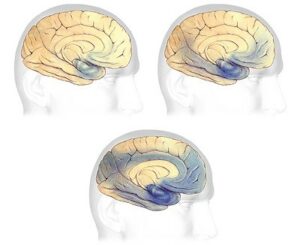Every 65 seconds, someone in the United States develops Alzheimer’s disease. Alzheimer’s is the most common cause of dementia, leading to memory loss, thinking and behavior, with currently 5.8 million Americans living with this disease. Alzheimer’s is a progressive disease, which means symptoms worsen as time goes on. In the early stages of the disease, a person may not even realize they are developing Alzheimer’s. People become more aware of the disease as it progresses and patients for instance, start to lose the ability to carry a conversation and respond to their environment.
People with Alzheimer’s often do not even realize something is wrong with them and think it is just part the aging process. The early symptoms of Alzheimer’s start with a difficulty remembering newly learned information. As the disease progresses, disorientation, mood and behavior changes, dates, times and places become a serious issue. Often people will also find it hard to recognize certain family members or friends.

Scientists are still unsure where Alzheimer’s disease starts, but they do know the two structures damaging and killing nerve cells in the brain. These two structures are known as plaques and tangles, which are protein fragments that build up inside the brain. With age, people develop plaques and tangles, due to the aging process, but people with Alzheimer’s develop them faster. As the plaques and tangles build up, they block communication among the nerve cells. When this happens, people start to lose memory and daily functions because their nerve cells are not firing properly and sending them the correct message.
Currently there is no cure for Alzheimer’s, but research has started to find out how it affects the brain. Current studies are underway to analyze different approaches to treatment. Options currently available include drug and non-drug options to help slow down the symptoms and improve the quality of life.
If you or your loved one is experiencing memory loss, talk with your doctor today. Click HERE to see the resources on our website for assisted living and home health care options for the surrounding area, if your loved one should need care.
Resources:
https://www.alz.org/alzheimer_s_dementia
